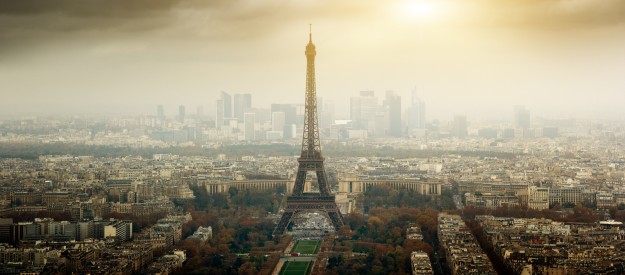"We are losing our attitude of wonder, of contemplation, of listening to creation and thus we no longer manage to interpret within it what Benedict XVI calls 'the rhythm of the love-story between God and man.'"
+ Pope Francis
Paris and the future of the world

Burying the dead will be the focus in Paris for weeks. Healing the wounded will take longer. This already has some wondering what the impact could be not just to United Nations climate talks, set to begin in the City of Lights on November 30th, but indeed on larger questions that in many ways will influence the future of the world.
As one COP21-watcher put it, Friday’s coordinated attacks have already dimmed the buildup to the climate talks.
Even if the international negotiations take place as planned—a huge task now made more complicated with increased security—the lingering stench of Friday’s massacre will be difficult ignore.
Planned vigils for a sickly planet must now include vigils for those killed at the Bataclan and elsewhere throughout Paris. What should have been a climate of hope in mankind’s ability to unite for the common good will certainly be clouded by the evil wrought upon a good and beautiful people, even if the negotiations may move forward by the civilized world's desire for a response of unity and resolve.
But then, the seemingly disparate issues of anthropogenic climate change and extremist violence are rooted in the same soil. In their own ways, both result from man’s denial of the laws of God—both the laws of nature and the natural laws that direct us toward the self-sacrifice of the Cross. Denying who we are—that is, made in the image and likeness of the Triune God that is love—results from and deepens our wounds. Thus blinded and butchered, we seek power and pleasure as we fall victim to the temptations and lies of our ancient enemy, who revels as we poison God's creation and slaughter each other.
And so, more than ever, the world needs Jesus Christ.
In Laudato Si’, Pope Francis writes that “[t]he God who created the universe out of nothing can also intervene in this world and overcome every form of evil. Injustice is not invincible.” [74]
Indeed, He already has intervened. And so must we if we are to be Christians.
With God's grace, we must speedily foster our inner conversions—our “ecological conversion,” as Saint John Paul II said, as well as our inner, spiritual conversion. And we must help others do the same.
We must tend to the smaller gardens that are our families, our friends, our vocations, our neighbors, and our communities if we are ever to tend the greater garden of Earth.
We must labor for justice and virtue in this world. And we must pray for the dead as they journey in the next life to perfection in Christ.
We must live what Christ taught us and we must tell others why—and for Whom—we do so.
If we hope to heal the world through international negotiations, now is the time to remember what it means to be Christian—that is, to preach the Gospel and love the world so much that we dare enter into it and baptize it in the name of the Father and of the Son and of the Holy Spirit (Mt 28:19).
And for those who have died: Eternal rest grant unto them, O Lord, and let perpetual light shine upon them. May the souls of the faithful departed, through the mercy of God, rest in peace. Amen.


















